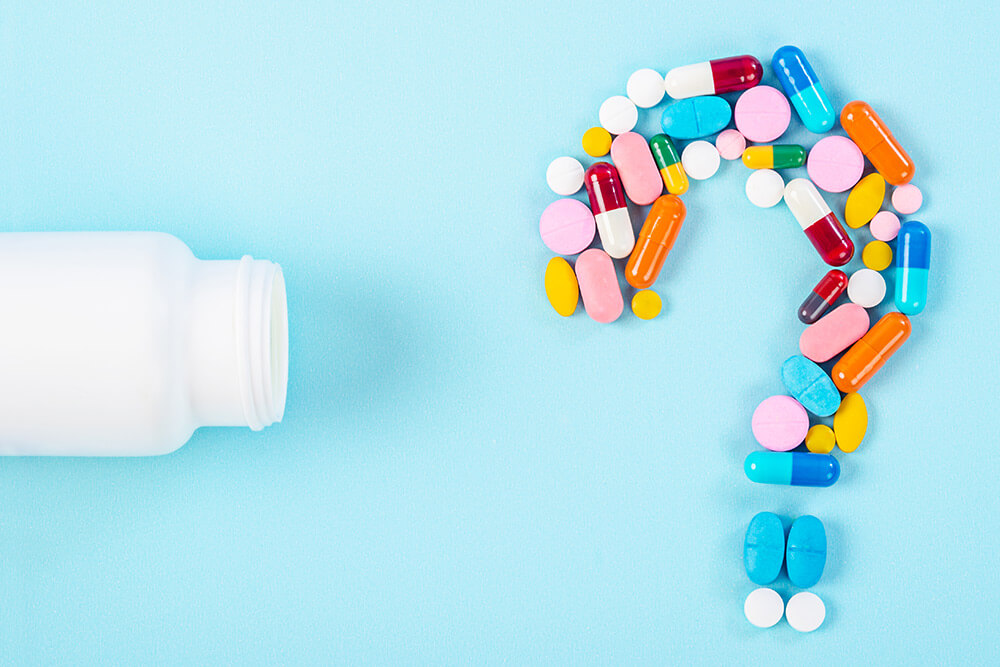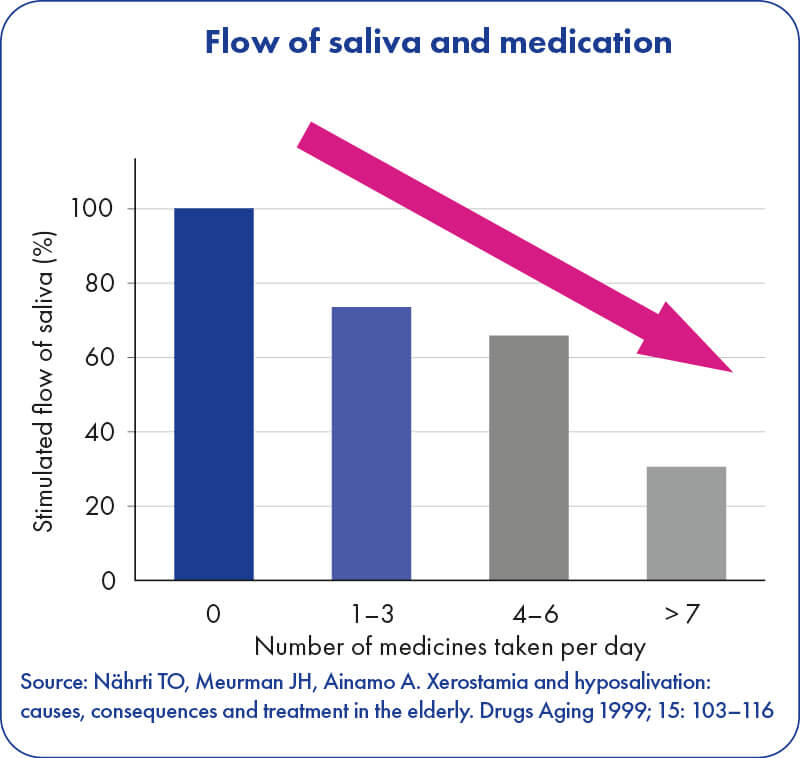Mouth dryness – when a dry mouth becomes a problem
A dry mouth feels unpleasant. It occurs as a natural reaction of the body to stressful situations. However, permanent mouth dryness, referred to as xerostomia by experts, is a widespread clinical picture. Mouth dryness not only has many causes, but can also have serious consequences for dental health and oral hygiene. It is a problem which needs to be taken seriously.
In this article you will find out how to distinguish the feeling of having a dry mouth from the actual disease, what the possible causes of dry mouth are, how to diagnose dry mouth, how dry mouth can impact your health and what you can do to prevent mouth dryness.
What is mouth dryness?
Normally three large and more than 500 small salivary glands keep our oral cavity moist with around 0.5 to 1.5 l of saliva. If the production of saliva is disturbed, this result in a dry mouth. If this problem persists, it is referred to as mouth dryness.
When we say something is "mouth-watering", we immediately know what is meant. Smelling, seeing or tasting something delicious immediately triggers saliva production. Yet the opposite also exists, namely a dry mouth caused by nerves or fear. The tongue sticks to the gums and speaking and swallowing becomes more difficult. A dry mouth is the body's natural way of reacting to stress when faced with particularly tense situations. Luckily, this state is not permanent and quickly passes.
However, it can become problematic if this dryness continues for an extended period and the mouth is continuously dry. This is not only unpleasant, but can lead to serious health issues or can be a sign of a medical condition. Saliva not only keeps the mouth moist, it also supports the digestion of food, protects teeth from caries, prevents infections by controlling the bacteria in the mouth and enables chewing, swallowing and speaking.
Causes of mouth dryness
There are numerous reasons as to why saliva production is disrupted resulting in dry mouth (xerostomia). The causes can be summarised into three categories. First, there are the general causes or habits that lead to a dry mouth. But a variety of medicines also affect saliva production and can cause dry mouth. Finally, dry mouth can be a symptom of anotherdisease.
Medication as a cause of mouth dryness
The consumption of medication is one of the most frequent causes of dry mouth. Dry mouth can occur as a side effect with over 400 prescription and over-the-counter medicines. These include products from the following drug groups:
- Anticholinergics for the treatment of lung diseases such as COPD and asthma
- Antidepressants for the treatment of depression
- Antiepileptic drugs used in epilepsy
- Antiemetics against nausea and vomiting
- Antihistamines for the treatment of allergies
- Antihypertensives to lower blood pressure, also known as beta-blockers or ACE inhibitors
- Medication to treat Parkinson's
- Chemotherapeutics or cytostatics
- Hypnotics used as sleeping pills
- Neuroleptics against anxiety
- Painkillers from the opioid family
- Sedatives or tranquillisers
- Spasmolytics with an antispasmodic effect
With increasing age, many people take more and more medication, so that this group of people is particularly often affected by dry mouth.
In addition to drugs and medicines, the consumption of drugs or intoxicants and narcotics can also encourage dry mouth.
Dry mouth as a symptom of a cold
Dry mouth and impaired saliva production may also be a concomitant or a symptom of another disease. It is therefore important to have dry mouth examined by a doctor if no underlying disease is known. Dry mouth is a known symptom for the following diseases:
- Acute or chronic inflammation and pathological changes (e.g., tumours) of the salivary glands (sialadenitis) lead to a reduction in salivary release.
- Illnesses, such as diabetes mellitus, thyroid gland or kidney disease, can affect the saliva content in the mouth.
- With Sjögren's syndrome (an autoimmune disease) a chronic inflammation destroys the salivary glands.
- Dry mouth can also be a warning sign for mental illness, such as depression or anxiety disorders.
In addition, treatment methods, such as irradiation of the mouth, jaw and face can also damage the salivary glands. .
General causes of dry mouth
In many cases, however, the causes of dry mouth are harmless causes or it can be explained by some habits:
- If you tend to breathe through your mouth, it will dry out quicker.
- If you snore or have a blocked nose, breathing through the mouth is increased.
- A lack of liquids, e.g., from not drinking enough, can cause mouth dryness.
- As we age, not only does our intake of medication increase, but also some bodily functions such as saliva production slow down.
- Changes in hormone levels also affect the salivary glands and women during and after the menopause frequently experience permanent mouth dryness.
- Many smokers suffer from a dry mouth.
Due to the variety of possible causes, it is assumed that almost 50 per cent of the population suffers from dry mouth.
Symptoms of dry mouth
We all have a dry mouth from time to time. Yet, if this problem persists, you may have a problem with saliva production. The following symptoms are typical for mouth dryness:
- A stick, dry feeling in the mouth
- Problems swallowing
- A burning sensation on the tongue
- A feeling of dryness in the throat
- Cracked lips
- A poor sense of taste or a metallic taste in the mouth
- Oral thrush (white film on the tongue and mucous membranes)
- Frequent bad breath
- Difficulties chewing and speaking
This self-test helps you to determine whether you are affected.
If you answer at least 3 points with yes, it is likely that you suffer from dry mouth:
- My mouth and/or throat feel dry.
- My lips feel dry and/or are often cracked.
- I feel like I do not have enough saliva.
- I am always thirsty.
- I need a drink when I wake up during the night.
- I have difficulties eating dry food.
- I cannot eat anything without drinking something at the same time.
- I often eat boiled sweets or chew gum.
- I have difficulties swallowing.
- I often breathe through my mouth.
- I do not drink enough (i.e. less than 1 litre per day).
- I am often stressed.
- I take medication on a regular basis.
Dangers and consequences of dry mouth

Dry mouth has a wide range of consequences and can lead to a significant restriction in quality of life.
- Reduced moisture of the oral mucosa makes speaking, chewing and swallowing more difficult.
- A lack of saliva makes it difficult to tear up food and reduces the smoothness of biting. This results in pain when chewing and swallowing. In addition, hard food can cause injuries in the oral cavity.
- If food is not pre-digested in the mouth with salivary enzymes, this can lead to digestion problems.
- Dry mouth can cause taste impairments.
- If the important rinsing effect of saliva is not produced due to a reduced flow of saliva, harmful bacteria cannot be completely transported out of the mouth. The protective antibacterial and antiviral effect is also weakened and the teeth are exposed to acid attacks without protection. Both the metabolic products of various bacteria and the acids from foodstuffs and drinks remove minerals from the teeth. When the flow of saliva is normal, saliva can act as a buffer against these acids while providing mineral salts to the teeth for remineralisation. If saliva production is reduced, acids cannot be neutralised and the teeth are not provided with the required minerals. This can lead to caries and inflammation of the oral mucosa, such as gum inflammation, burning mouth syndrome or bad breath.
- If the mouth is dry, there may be not enough calcium and the natural caries protection provided by saliva may be reduced.
Treating dry mouth
The only lasting way to cure a dry mouth is to treat the causes. If your dry mouth is caused by medication, your doctor may be able to change the active ingredient or dosage. If your salivary glands are not working properly but still produce saliva, your doctor may prescribe a medication that supports the function of thesalivary glands.
If the cause of your dry mouth cannot be remedied or until a remedy is found, you can improve the moisture levels in your mouth in a number of ways. Your dentist may recommend a saliva substitute. It is also possible that rinsing with a alcohol-free mouth rinse helps.
Immediate help for dry mouths
If your dry mouth is particularly acute and uncomfortable, then measures that provide immediate relief are available. What's more, habits that stimulate saliva production, or at least do not further exacerbate dry mouth, can be easily integrated in our daily routine.
You should avoid or reduce the following:
- Not drinking enough
- Drinks containing caffeine such as coffee, black tea and other soft drinks which cause the mouth to dry out
- Tobacco and alcohol as these dry out the mouth
- Hard, dry food such as bread crusts and pastry
- Sugary and acidic drinks
- Spicy or salty foods, as these can cause pain in a dry mouth and further dry out the mouth
- Time in dry or air-conditioned rooms
- Drinking alcohol
- Smoking
- High levels of stress
What you can do to prevent dry mouth:
- Drink water and sugar-free drinks regularly
- Chew sugar-free chewing gum or suck on hard sugar-free sweets which boost the flow of saliva (if the salivary glands still function)
- Opt for foods with a high water content
- Use a humidifier at night
This may also be of interest to you:

Inflammation of the gums: Gingivitis or periodontitis?
More than 50% of adults suffer from gum problems. Find out more about what can help.

Sensitive teeth – when enjoying food becomes impossible
Sensitive teeth are often caused by exposed tooth necks or defects in the dental enamel, find out more about this.

Caries: How to protect your teeth
Caries is one of the most common diseases in the world. Find out more about the caries and its causes.






